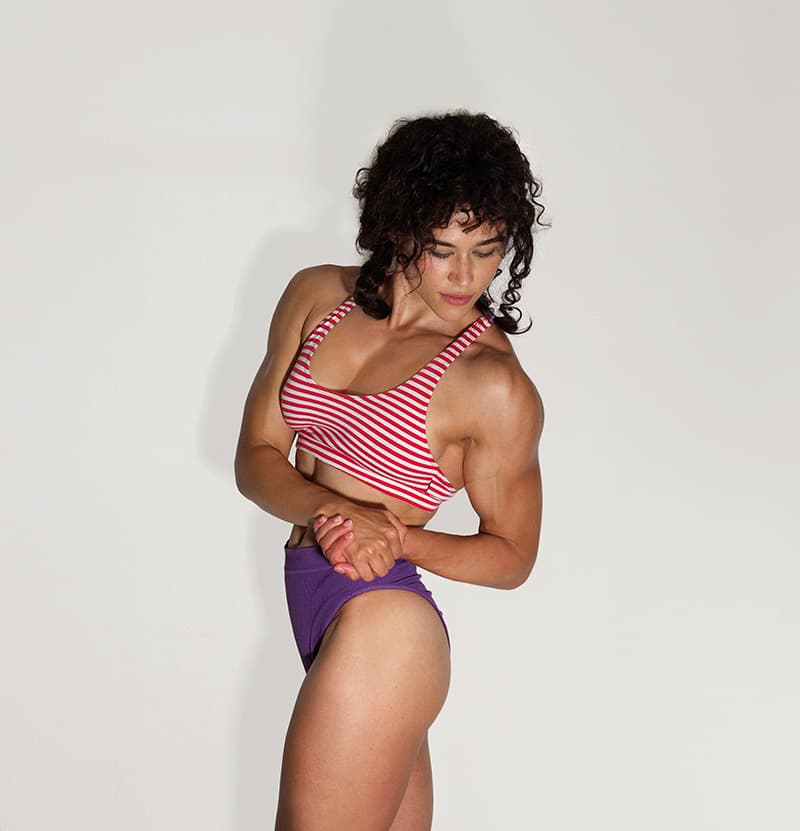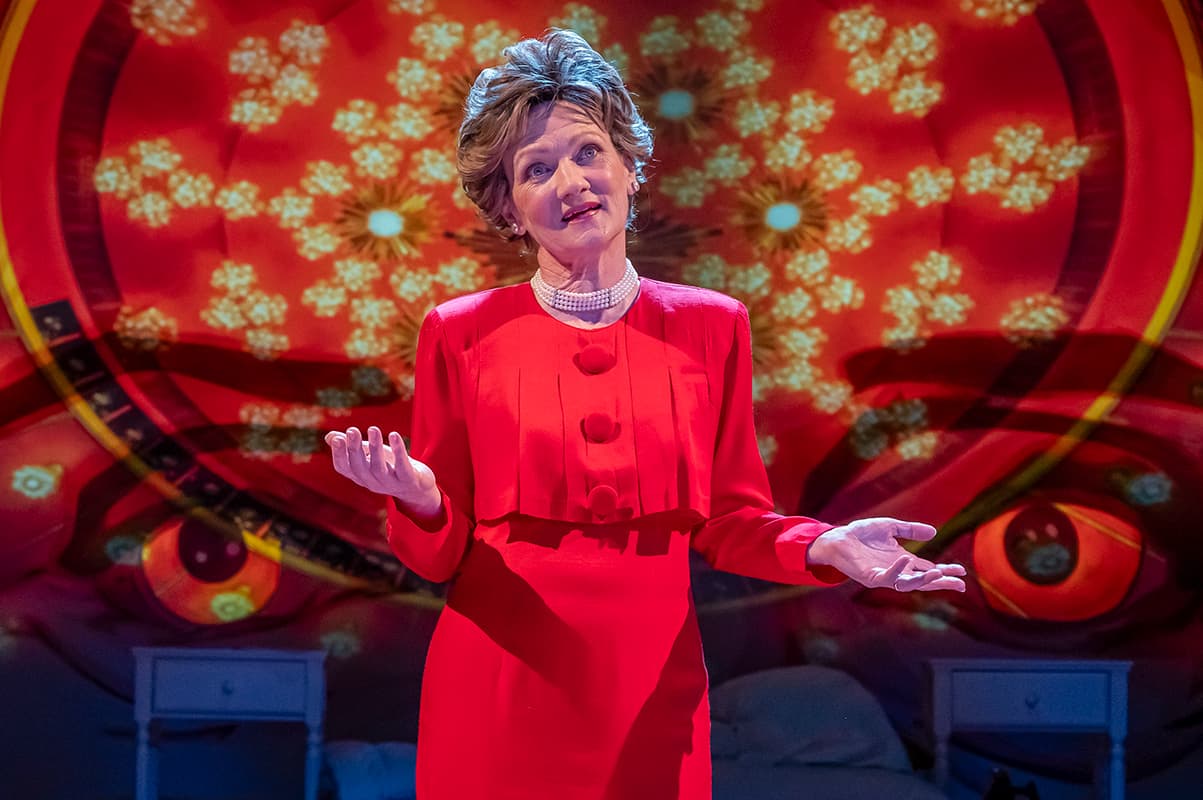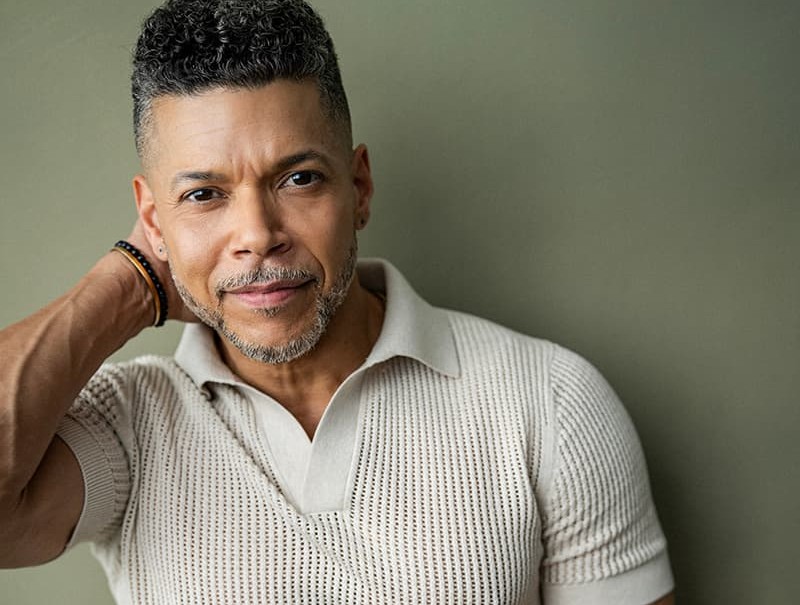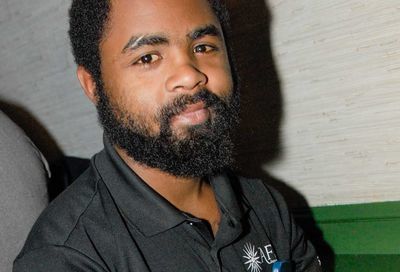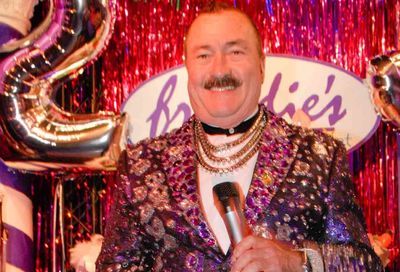An interview with Duran Duran’s Nick Rhodes
Nick Rhodes on the Paper Gods tour, the impact of MTV, and his LGBT fans

METRO WEEKLY: Let’s talk a little bit about the tour. It’s resuming in America at the end of March.
NICK RHODES: We’d done a few dates previously in America, but they’d been a slightly smaller production. We actually did an arena tour in the U.K. in December last year, which we used our full production on. So we thought, “We really ought to come back to America with this.” We’re coming at the end of March to play shows through April and then we come back to Europe again for May-June and return to America in July to play even more shows.
MW: The constant travelling must be a grind.
RHODES: Well, I have to confess: I love being in the studio. And I’ve always enjoyed the shows themselves. I don’t think any musician particularly enjoys all of the travel and the tiredness, but when you’re over that bit and you’re just playing the shows, it’s very uplifting. And, since we’ve been playing now for more than three decades, you learn what works and how to put together a real experience for people, because what we do is try to create a show that we’d like to see from somebody else.
You’ve got to take people on a journey, and we’ve got a lot of music now to choose from, so balancing the set between things we wouldn’t get out of the building if we didn’t play to interesting new songs and a few surprises, that in itself is quite an art.
MW: What songs can you not get out of the building if you didn’t play?
RHODES: Things like “Rio” or “Hungry Like the Wolf” or “Girls on Film.” “Wild Boys.” We can sort of miss a few out at this point because there are quite a lot of singles.
MW: As long as you play The Reflex. That was always one of my favorites.
RHODES: Ah, you see? There you go. That one sometimes is in and sometimes is out. Which show are we talking about? The DC show. I’ll try and make a mental note about that.
MW: I bring up “The Reflex” because my first exposure to the song was through MTV, back in the days it was a music channel. I’ve never forgotten the image of the wave washing over the audience. It makes me wonder: how did video change the way we perceive music?
RHODES: It obviously brought another dimension to music, and there were artists of our generation who embraced it because it was exciting and new. It was state-of-the art at that time. There were older artists who were a little more hesitant, really, to get involved. I think they felt it had perhaps turned the seriousness of some of their songwriting and musicianship into showbiz, which wasn’t as appealing to them. But eventually you’ve got a lot of those artists making videos — and some of them made some really good videos, too.
We were part of that wave with a lot of other British artists, particularly, who made interesting videos at that time, like The Cure and Billy Idol. And obviously in America, you had mega-artists like Michael Jackson and Madonna and Prince, who also moved into that medium. I’m not sure how much it really changed things. But it was exciting for a time. When somebody told me the first time about MTV and said, “It’s a 24-hour music channel, and they just play music non-stop,” that was unbelievable. Wow! How has this not happened before and how great that we’ve got a channel that we can turn on any time to see music. It was a revelation.
Then, as MTV turned into more of a game show channel many years later, you started to realize that that was a short moment. It burned bright and fast and then it disappeared. Now we all watch videos on YouTube or Vevo. It’s on demand. You just type it in and there it is. If you have a great video, it’s fun to watch, but how many times do you want to watch it? Whereas with a song, you can still listen for many, many, many years later, if it’s a great song.
MW: Duran Duran’s videos are so visually striking, however. They are the kind of videos you want to watch repeatedly.
RHODES: There are plenty of videos — those amazing Peter Gabriel videos always stuck with me. When people create that kind of visual language and marry it with a great song, then you do have something special. Don’t get me wrong — I’m not suggesting that video didn’t matter that much, not at all. What I’m saying is that I think video was the enhancer. If you had a great song, it really helped it.
MW: For a period of time, I felt music videos damaged cinema, almost irreparably, but we seem to have recovered from it. There was a period of time when the fast, incoherent editing of music video bled over into cinema and actually the movies of that time were very, very…
RHODES: Bad. [Laughs.] But again, it depends. There’s some amazing movies around that time, too. If you look up Bladerunner or Terry Gilliam’s Brazil, who used elements of modern techniques for editing and stuff. I think what you got was a lot of that Hollywood junk that was churned out in the style of music videos, which was just being sort of stamped out weekly. So yeah, I agree with you entirely. It was just pointless junk — but I still think that Hollywood pumps out a lot of pointless junk.
MW: You’re an artist, you’re a visualist, you’re a photographer — you were friends with Andy Warhol and Keith Haring — so video seems seems to suit your personality.
RHODES: Yeah. When we were first told, “Hey, we’re gonna make a film clip that goes with your song,” we couldn’t believe our luck. We thought immediately, “Great. So what can we do with it? Let’s do something really special. Let’s not just stand there performing.”
And that led to the “Girls on Film” video, it led to all the videos on locations — Sri Lanka, Antigua — because it was an open book then. Nobody had done anything and you really just needed a good idea. There were, as I said, lots of other people out there that had amazing ideas, too. I think the videos that worked best were those that didn’t translate the songs’ lyrics literally. There was a lot of that in the ’80s, and some of them were pretty disastrous. But with ours, we looked at them individually, as in, “What can we do with this?” in the same way that when we wrote a song we’d say, “Where are we going to take it?” We’d apply those rules to video.
MW: Duran Duran is nearly four decades old, which is remarkable for any band. What’s the secret to your longevity?
RHODES: I think songwriting is the simple answer. Because if you have a chemistry together that works well for songwriting, then you always get something very different as a band than you would get writing as a solo artist. There’s a different kind of tension in music that’s pulling in different directions written by several people. And so we did realize quite early on that we had this unique combination of energy, and what each person brings to the sound. There isn’t somebody else where that I think “Oh, I wish that was our drummer” or “I wish that was our singer.” We’re very, very flexible and we set our boundaries incredibly wide early, early on.
You look at an R&B band who just writes in that style, and there’s a lot of limitations. For us, we’ve looked at everything. We’ve enabled ourselves to stretch wherever we liked and people would accept it as Duran Duran. I think if we hadn’t done that early on, it would be much harder to move with the times.
MW: How important is it for a band to have its own unique, specific sound?
RHODES: Personally, I think it’s critical. One of the most important things about being a band is that you’ve got your own identify, that you know who you are and that you’ve got a voice — a unique voice. Because if you can’t carve out that space for yourself, then you’re in this vast ocean with all the other people swimming for survival and trying to get their head above water and get noticed. A lot of it gets drowned.
MW: Has your vision for the band itself changed over time?
RHODES: I don’t think it has changed fundamentally. The vision for the band was always to be something that went against the grain of what was going on but always kept our sound, individually, meaning that certain things that each of us like. Strong melody has always been incredibly important, and Simon’s voice is naturally very melodic. He’s got a big range, so we have that flexibility. I like electronic pulses and synthesizers, I like soundscapes, so that was a big part of what I bring to it. And John and Roger are able to play many different styles — funk, disco, rock, punk — whatever it is we require, but they’re a very, very tight polished rhythm section. And rock guitar and funk guitar gave us so many colors in the palate. We can paint a different picture every time with them.
MW: There’s a keyboard part on “Change the Skyline” that’s very unusual. Where do you get inspiration for things like that?
RHODES: We listen to a lot of modern music. There are certain things that sink in and you add them to your lexicon of sound and melodic ideas. We listen to a lot of electronic dance music. Some hip hop, some indie music, any new bands that sound interesting. And we listen to a vast catalogue of the old music. Between the four of us, we’ve got pretty enormous musical knowledge at this point, because we’re all big fans. A day doesn’t go by when we don’t play music. So I suppose with the sounds on “Change the Skyline,” they’re not typical. Some of them are the kind of thing we would always do, but that piece of music and the way that it worked needed a sharpness and a mood that somehow took you into this cityscape, and that’s what those sounds really represented to me.
MW: Sometimes I’ll listen to a song and think “It could have gone in so many other directions.” Arriving at the arrangement, arriving at the particular moment of “It’s finished, this is what we’re going to release,” it must be both gratifying and frustrating, I suspect.
RHODES: There’s one song in the album called “Danceophobia” which had more iterations than any other song we’ve done as a band in our career. Literally, there must be 6 or 7 different versions and then, there’s loads and loads and loads of variations with every one of those. There’s tempo changes, there’s about ten different verses, there’s all these things. The only reason it survived — because normally things, after about half a dozen to a dozen changes, are left in a pile on the floor in a scrap heap — is that we felt the chorus was so strong for what it was, and nobody was prepared to let go of it. And we worked and worked and worked. One day, John and I cracked it. We completely changed the verse again, pulled apart the rhythm, we did some of the guitars that were on there and it just fell into place. Now, it’s not necessarily my favorite track on the album, but it was such a challenge to actually get it right. And sometimes that happens. With other songs, they’re written and recorded pretty much in a day and probably another day or two just changing some melodies or some sounds. You just never know where it’s gonna go, where it’s gonna take you, especially when there’s a group of you and someone will really love it and then someone won’t like it. So then it gets pulled into a different shape.
MW: Where do you fall on the topic of streaming?
RHODES: Well, I actually pushed the button [to upload] on the world’s first song that was sold over the Internet. It was a for “Electric Barbarella,” in 1997. When I did this, the record label didn’t want to do it. I had to fight to have the opportunity, but I was so convinced that this was the future of music, that people would consume things online. This is about six years before iTunes launched. I’d sensed that Napster was such an amazing technology and what they discovered was really the beginning of the future. That’s why I was keen to use that technology to sell music, so that all musicians could at least get paid for what they do. I think that’s particularly important for younger artists — otherwise they don’t get to keep making music.
After that, the record labels, instead of doing what I’d personally hoped would happen and actually befriending Napster and figuring how they get their own systems up and running to sell music, tried to smash the machine and stop progress. They wasted about eight to ten years and all of the major labels, some of them lost their companies. And the ones that survived lost their opportunity to be a part of the modern music world, because Apple stole all the thunder. We’re down to, what, three real major record labels at this point? There were hundreds of them when we started out.
In that way I’m a bit saddened because I think there should be more choice for artists to go to labels. We’ve lost a lot of artist development and that’s a very crucial part for younger artists. Now labels throw their money at something and if it’s not a hit, they trash it and move on to the next one — it’s all over. Think if people hadn’t spent money on development of artists like Pink Floyd, for example, who really didn’t have any big hit and then wrote “Dark Side of the Moon.” You’ve got to stick with artists sometimes and you’ve got to see that talent and nurture it. And that’s what worries me — everything’s like fast food.
The other thing is that the economic model is broken and whilst none of us like to think about music just as a business and we all like to think of it as an art form, you’ve still got to be able to sell something to make the piece of art in the first place. And I think it’s very, very hard for young artists to get past that first album and keep going to make things when they’re just not at that point yet where they get enough royalties from iTunes or whether they’re getting enough streams on Spotify, because actually the payment is pretty miserable for artists. I think it will eventually get fixed. The YouTube issue needs to be fixed. If someone in the Midwest has made their own video to go with your song, I don’t mind that at all. But if that song is being broadcast and people are going there to listen to it, there needs to be some kind of fair payment system for that. So from that point of view, it needs a lot of fixing.
From the point of view of the availability and the convenience for every consumer worldwide, I couldn’t possibly be more pro. I think it’s amazing that we’ve all got music at our fingertips 24 hours a day worldwide and we can find almost anything we want.
[polldaddy poll=9351656]
MW: Do you miss the tangibility of albums?
RHODES: When we get the vinyl copy printed and I can look at the album cover and can take the vinyl out and drop the needle onto it and play it — it’s still my favorite thing. There’s a fetish about it that is so great, and that is never going to go away from me. I love the convenience, like we all do, of just pressing a button and there it is on my computer. But vinyl still sounds better than anything else. It still looks better than anything else. And there is a resurgence because there’s people out there who have realized that “Wow! This is a different world,” particularly with young kids who have never experienced it at the time. So yeah, I do miss it, but I’m always happy to go with progress. As long as those who want to can get back into that other world.
MW: As you know, we’re an LGBT magazine. Can you talk a bit about your gay fans and what they’ve meant to you?
RHODES: We’ve always had a pretty substantial gay and lesbian following. We played a lot of gay clubs early on. I remember one in San Francisco particularly on our very first U.S. tour called the I-Beam. I’ve never ever been in a room that was so hot in my life. It was absolutely jammed with mostly guys, and we had the best show. They were just so energetic, the audience, really just wanting to have the best time.
But we relate to all people, whatever preferences they have, but I feel we have connected quite well with the gay audience because we’re so open to things. We had gay designers working with us right at the very beginning when we were teenagers, so a lot of the people we’ve employed over the years have been gay or lesbian. It’s very sort of normal for us.
MW: Thirty years, the world was not as open-minded towards gay and lesbians.
RHODES: I agree with you, and I’m as thrilled as anyone to see we’ve certainly made some very, very big steps in the right direction on that. There are still places where there’s prejudice, but it is funny how the world’s changed generally. I used to get on a night bus with John Taylor and we’d be dressed in New Romantic clothes, which were pretty colorful and quite unusual. I had a shock of dyed blond hair and I wore a lot more makeup then than I do now. And it was always a tricky experience getting on the night bus to come home because inevitably someone would be aggressive to us. And we weren’t fighters — we were peaceful people. And so it always alarmed us from that point that just because you looked a bit different and thought a little different from someone else that somebody thought it was okay to be mean and aggressive. I still to this day don’t really understand why that awful trait exists in human nature, but I think we’ve all experienced enough to know how real it is.
Duran Duran: The Paper Gods Tour with Chic featuring Nile Rodgers will hit Washington, D.C.’s Verizon Center on Friday, April 8. Tickets are available at Ticketmaster.com. For full tour information, visit duranduranmusic.com. Paper Gods is available for purchase on iTunes and Amazon.com as well as most streaming music services.
Support Metro Weekly’s Journalism
These are challenging times for news organizations. And yet it’s crucial we stay active and provide vital resources and information to both our local readers and the world. So won’t you please take a moment and consider supporting Metro Weekly with a membership? For as little as $5 a month, you can help ensure Metro Weekly magazine and MetroWeekly.com remain free, viable resources as we provide the best, most diverse, culturally-resonant LGBTQ coverage in both the D.C. region and around the world. Memberships come with exclusive perks and discounts, your own personal digital delivery of each week’s magazine (and an archive), access to our Member's Lounge when it launches this fall, and exclusive members-only items like Metro Weekly Membership Mugs and Tote Bags! Check out all our membership levels here and please join us today!




